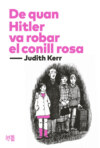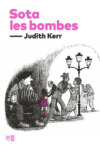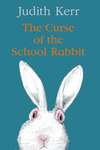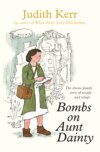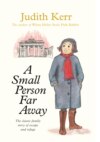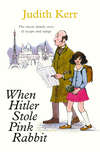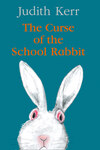Kitabı oku: «Out of the Hitler Time trilogy: When Hitler Stole Pink Rabbit, Bombs on Aunt Dainty, A Small Person Far Away», sayfa 2
Chapter Two 
Anna’s first thought was so terrible that she could not breathe. Papa had got worse in the night. He had been taken to hospital. Perhaps he …She ran blindly out of the room and found herself caught by Heimpi.
“It’s all right! Your father has gone on a journey.”
“A journey?” Anna could not believe it. “But he’s ill – he had a temperature …”
“He decided to go just the same,” said Heimpi firmly. “Your mother was going to explain it all to you when you came home from school. Now I suppose you’ll have to hear straight away and Fräulein Schmidt will be kept twiddling her thumbs for you.”
“What is it? Are we going to miss school?” Max appeared hopefully on the landing.
Then Mama came out of her room. She was still in her dressing-gown and looked tired.
“There’s no need to get terribly excited,” she said. “But there are some things I must tell you. Heimpi, shall we have some coffee? And I expect the children could eat some more breakfast.”
Once they were all settled in Heimpi’s pantry with coffee and rolls Anna felt much better, and was even able to calculate that she would miss the geography lesson at school which she particularly disliked.
“It’s quite simple,” said Mama. “Papa thinks Hitler and the Nazis might win the elections. If that happened he would not want to live in Germany while they were in power, and nor would any of us.”
“Because we’re Jews?” asked Anna.
“Not only because we’re Jews. Papa thinks no one would be allowed to say what they thought any more, and he wouldn’t be able to write. The Nazis don’t like people to disagree with them.” Mama drank some of her coffee and looked more cheerful. “Of course it may never happen and if it did it probably wouldn’t last for long – maybe six months or so. But at the moment we just don’t know.”
“But why did Papa leave so suddenly?” asked Max.
“Because yesterday someone rang him up and warned him that they might be going to take away his passport. So I packed him a small suitcase and he caught the night train to Prague – that’s the quickest way out of Germany.”
“Who could take away his passport?”
“The police. There are quite a few Nazis in the police.”
“And who rang him up to warn him?”
Mama smiled for the first time.
“Another policeman. One Papa had never met – but who had read his books and liked them.”
It took Anna and Max some time to digest all this.
Then Max asked, “But what’s going to happen now?”
“Well,” said Mama, “it’s only about ten days until the elections. Either the Nazis lose, in which case Papa comes back – or they win, in which case we join him.”
“In Prague?” asked Max.
“No, probably in Switzerland. They speak German there – Papa would be able to write. We’d probably rent a little house and stay there until all this has blown over.”
“Heimpi too?” asked Anna.
“Heimpi too.”
It sounded quite exciting. Anna was beginning to imagine it – a house in the mountains …goats …or was it cows? …when Mama said, “There is one thing more.” Her voice was very serious.
“This is the most important thing of all,” said Mama, “and we need you to help us with it. Papa does not want anyone to know that he has left Germany. So you must not tell anyone. If anyone asks you about him you must say that he’s still in bed with ‘flu.”
“Can’t I even tell Gunther?” asked Max.
“No. Not Gunther, nor Elsbeth, not anyone.”
“All right,” said Max. “But it won’t be easy. People are always asking after him.”
“Why can’t we tell anyone?” asked Anna. “Why doesn’t Papa want anyone to know?”
“Look,” said Mama. “I’ve explained it all to you as well as I can. But you’re both still children – you can’t understand everything. Papa thinks the Nazis might …cause us some bother if they knew that he’d gone. So he does not want you to talk about it. Now are you going to do what he asks or not?”
Anna said, yes, of course she would.
Then Heimpi bundled them both off to school. Anna was worried about what to say if anyone asked her why she was late, but Max said, “Just tell them Mama overslept – she did, anyway!”
In fact, no one was very interested. They did high-jump in Gym and Anna jumped higher than anyone else in her class. She was so pleased about this that for the rest of the morning she almost forgot about Papa being in Prague.
When it was time to go home it all came back to her and she hoped Elsbeth would not ask her any awkward questions – but Elsbeth’s mind was on more important matters. Her aunt was coming to take her out that afternoon to buy her a yo-yo. What kind did Anna think she should choose? And what colour? The wooden ones worked best on the whole, but Elsbeth had seen a bright orange one which, though made of tin, had so impressed her with its beauty that she was tempted. Anna only had to say Yes and No, and by the time she got home for lunch the day felt more ordinary than she would ever have thought possible that morning.
Neither Anna nor Max had any homework and it was too cold to go out, so in the afternoon they sat on the radiator in the nursery and looked out of the window. The wind was rattling the shutters and blowing great lumps of cloud across the sky.
“We might get more snow,” said Max.
“Max,” said Anna, “do you hope that we will go to Switzerland?”
“I don’t know,” said Max. There were so many things he would miss. Gunther …his gang with whom he played football …school …He said, “I suppose we’d go to a school in Switzerland.”
“Oh yes,” said Anna. “I think it would be quite fun.” She was almost ashamed to admit it, but the more she thought about it the more she wanted to go. To be in a strange country where everything would be different – to live in a different house, go to a different school with different children – a huge urge to experience it all overcame her and though she knew it was heartless, a smile appeared on her face.
“It would only be for six months,” she said apologetically, “and we’d all be together.”
The next few days passed fairly normally. Mama got a letter from Papa. He was comfortably installed in a hotel in Prague and was feeling much better. This cheered everyone up.
A few people inquired after him but were quite satisfied when the children said he had ‘flu. There was so much of it about that it was not surprising. The weather continued very cold and the puddles caused by the thaw all froze hard again – but still there was no snow.
At last on the afternoon of the Sunday before the elections the sky turned very dark and then suddenly opened up to release a mass of floating, drifting, whirling white. Anna and Max were playing with the Kentner children who lived across the road. They stopped to watch the snow come down.
“If only it had started a bit earlier,” said Max. “By the time it’s thick enough for tobogganing, it will be too dark.”
At five o’clock when Anna and Max were going home it had only just stopped. Peter and Marianne Kentner saw them to the door. The snow lay thick and dry and crunchy all over the road and the moon was shining down on it.
“Why don’t we go tobogganing in the moonlight?” said Peter.
“Do you think they’d let us?”
“We’ve done it before,” said Peter, who was fourteen. “Go and ask your mother.”
Mama said they could go provided they all stayed together and got home by seven. They put on their warmest clothes and set off.
It was only a quarter of an hour’s walk to the Grunewald, where a wooden slope made an ideal run down to a frozen lake. They had tobogganed there many times before, but it had always been daylight and the air had been loud with the shouts of other children. Now all they could hear was the soughing of the wind in the trees, the crunching of the new snow under their feet, and the gentle whir of the sledges as they slid along behind them. Above their heads the sky was dark but the ground shone blue in the moonlight and the shadows of the trees broke like black bands across it.
At the top of the slope they stopped and looked down. Nobody had been on it before them. The shimmering path of snow stretched ahead, perfect and unmarked, right down to the edge of the lake.
“Who’s going down first?” asked Max.
Anna did not mean to, but she found herself hopping up and down and saying. “Oh please – please …!”
Peter said, “All right – youngest first.”
That meant her because Marianne was ten.
She sat on her sledge, held on to the steering rope, took a deep breath and pushed off. The sledge began to move, rather gently, down the hill.
“Go on!” shouted the boys behind her. “Give it another push!”
But she didn’t. She kept her feet on the runners and let the sledge gather speed slowly. The powdery snow sprayed up all round her as the sledge struck it. The trees moved past, slowly at first, then faster and faster. The moonlight leapt all round her. At last she seemed to be flying through a mass of silver. Then the sledge hit the hump at the bottom of the slope, shot across it, and landed in a dapple of moonlight on the frozen lake. It was beautiful.
The others came down after her, squealing and shouting.
They went down the slope head first on their stomachs so that the snow sprayed straight into their faces. They went down feet first on their backs with the black tops of the fir trees rushing past above them. They all squeezed on to one sledge together and came down so fast that they shot on almost to the middle of the lake. After each ride they struggled back up the slope, panting and pulling the sledges behind them. In spite of the cold they were steaming inside their woollies.
Then it began to snow again. At first they hardly noticed it, but then the wind got up and blew the snow in their faces. All at once Max stopped in the middle of dragging his sledge up the slope and said, “What time is it? Oughtn’t we to be getting back?”
Nobody had a watch and they suddenly realized that they had no idea how long they had been there. Perhaps it was quite late and their parents had been waiting for them at home.
“Come on,” said Peter. “We’d better go quickly.” He took off his gloves and knocked them together to shake the caked snow off them. His hands were red with cold. So were Anna’s, and she noticed for the first time that her feet were frozen.
It was chilly going back. The wind blew through their damp clothes and with the moon hidden behind the clouds the path was black in front of them. Anna was glad when they were out of the trees and in a road. Soon there were street lamps, houses with lighted windows, shops. They were nearly home.
An illuminated clockface showed them the time. After all it was not yet quite seven. They heaved sighs of relief and walked more slowly. Max and Peter began to talk about football. Marianne tied two sledges together and scampered wildly ahead on the empty road, leaving a network of overlapping tracks in the snow. Anna lagged behind because her cold feet hurt.
She could see the boys stop outside her house, still talking and waiting for her, and was just going to catch them up when she heard the creak of a gate. Something moved in the path beside her and suddenly a shapeless figure loomed up. For a moment she was very frightened – but then she saw that it was only Fräulein Lambeck in some sort of furry cloak and with a letter in her hand.
“Little Anna!” cried Fräulein Lambeck. “Fancy meeting you in the dark of the night! I was just going to the post box but did not think to find a kindred spirit. And how is your dear Papa?”
“He’s got ‘flu,” said Anna automatically.
Fräulein Lambeck stopped in her tracks.
“Still got ‘flu, little Anna? You told me he had ‘flu a week ago.”
“Yes,” said Anna.
“And he’s still in bed? Still got a temperature?”
“Yes,” said Anna.
“Oh, the poor man!” Fräulein Lambeck put a hand on Anna’s shoulder. “Are they doing everything for him? Does the doctor come to see him?”
“Yes,” said Anna.
“And what does the doctor say?”
“He says …I don’t know,” said Anna.
Fräulein Lambeck leaned down confidentially and peered into her face. “Tell me, little Anna,” she said, “how high is your dear papa’s temperature?”
“I don’t know!” cried Anna, and her voice came out not at all as she had meant but in a sort of squeak. “I’m sorry but I must go home now!” – and she ran as fast as she could towards Max and the open front door.
“What’s the matter with you?” said Heimpi in the hall. “Someone shoot you out of a cannon?”
Anna could see Mama through the half-open door in the drawing room.
“Mama!” she cried, “I hate lying to everybody about Papa. It’s horrible. Why do we have to do it? I wish we didn’t have to!”
Then she saw that Mama was not alone. Onkel Julius (who was not really an uncle but an old friend of Papa’s) was sitting in an armchair on the other side of the room.
“Calm yourself,” said Mama quite sharply. “We all hate lying about Papa, but just now it’s necessary. I wouldn’t ask you to do it if it weren’t necessary!”
“She got caught by Fräulein Lambeck,” said Max who had followed Anna in. “You know Fräulein Lambeck? She’s ghastly. You can’t answer her questions even when you’re allowed to tell the truth!”
“Poor Anna,” said Onkel Julius in his high voice. He was a gentle wispy man and they were all very fond of him. “Your father asked me to tell you that he misses you both very much and sends you lots of love.”
“Have you seen him then?” asked Anna.
“Onkel Julius has just come back from Prague,” said Mama. “Papa is fine and he wants us to meet him in Zurich, in Switzerland, on Sunday.”
“Sunday?” said Max. “But that’s only a week. That’s the day of the elections. I thought we were going to wait and see who won, first!”
“Your father has decided he’d rather not wait.” Onkel Julius smiled at Mama. “I do think he’s taking all this too seriously.”
“Why?” asked Max. “What’s he worried about?”
Mama sighed. “Ever since Papa heard of the move to take away his passport he’s been worried that they might try to take away ours – then we wouldn’t be able to leave Germany.”
“But why should they?” asked Max. “If the Nazis don’t like us, surely they’d be glad to get rid of us.”
“Exactly,” said Onkel Julius. He smiled at Mama again. “Your husband is a wonderful man with a wonderful imagination, but frankly in this matter I think he’s off his head. Never mind, you’ll all have a lovely holiday in Switzerland and when you come back to Berlin in a few weeks’ time we’ll all go to the Zoo together.” Onkel Julius was a naturalist and went to the Zoo all the time. “Let me know if I can help with any of the arrangements. I’ll see you again, of course.” He kissed Mama’s hand and went.
“Are we really leaving on Sunday?” asked Anna.
“Saturday,” said Mama. “It’s a long way to Switzerland. We have to spend a night in Stuttgart on the way.”
“Then this is our last week at school!” said Max.
It seemed incredible.
Chapter Three 
After that everything seemed to go very quickly, like a film that has been speeded up. Heimpi was busy sorting and packing all day long. Mama was nearly always out or on the telephone, arranging for the lease of the house or for the storage of furniture after they had gone. Every day when the children came home from school the house looked more bare.
One day Onkel Julius called while they were helping Mama to pack some books. He looked at the empty shelves and smiled. “You’ll be putting them all back again, you know!”
That night the children were woken up by the sound of fire engines. Not just one or two but about a dozen were clanging their bells and racing along the main road at the end of their street. When they looked out of the window the sky above the centre of Berlin was brilliant orange. Next morning everyone was talking about the fire which had destroyed the Reichstag where the German Parliament met. The Nazis said that the fire had been started by revolutionaries and that the Nazis were the only people who could put a stop to that sort of thing – so everyone must vote for them at the elections. But Mama heard that the Nazis had started the fire themselves.
When Onkel Julius called that afternoon, for the first time he did not say anything to Mama about her being back in Berlin in a few weeks’ time.
The last days Anna and Max spent at school were very strange. As they still were not allowed to tell anyone that they were leaving they kept forgetting about it themselves during school hours. Anna was delighted when she was given a part in the school play and only remembered afterwards that she would never actually appear in it. Max accepted an invitation to a birthday party which he would never be able to attend.
Then they would go home to the ever emptier rooms, the wooden crates and the suitcases, the endless sorting of possessions. Deciding which toys to take was the hardest part. They naturally wanted to take the games compendium but it was too big. In the end there was only room for some books and one of Anna’s stuffed toys. Should she choose Pink Rabbit which had been her companion ever since she could remember, or a newly acquired woolly dog? It seemed a pity to leave the dog when she had hardly had time to play with it, and Heimpi packed it for her. Max took his football. They could always have more things sent on to them in Switzerland, said Mama, if it looked as though they were going to stay there a very long time.
When school was over on Friday Anna went up to her teacher and said quietly, “I shan’t be coming to school tomorrow. We’re going to Switzerland.”
Fräulein Schmidt did not look nearly as surprised as Anna expected but only nodded and said, “Yes …yes …I wish you luck.”
Elsbeth was not very interested either. She just said she wished she herself were going to Switzerland but that this was not likely to happen because her father worked in the Post Office.
Gunther was the hardest person to leave. Max brought him back to lunch after they had walked back from school together for the last time, though there were only sandwiches because Heimpi had not had time to cook. Afterwards they played hide-and-seek rather half-heartedly among the packing cases. It was not much fun because Max and Gunther were so gloomy and Anna had a struggle to keep down her own excitement. She was fond of Gunther and sorry to leave him. But all she could think was, “This time tomorrow we’ll be on the train …this time on Sunday we’ll be in Switzerland …this time on Monday …?”
At last Gunther went home. Heimpi had sorted out a lot of clothes for his mum in the course of her packing and Max went with him to help him carry them. When he came back he seemed more cheerful. He had dreaded saying goodbye to Gunther more than anything. Now at least it was over.
Next morning Anna and Max were ready long before it was time to leave. Heimpi checked that their nails were clean, that they both had handkerchiefs – two for Anna because she had a bit of a cold – and that their socks were held up properly by elastic bands.
“Goodness knows what state you’ll get into by yourselves,” she grumbled.
“But you’ll be with us again in a fortnight,” said Anna.
“There’s a lot of dirt can settle on a neck in a fortnight,” said Heimpi darkly.
Then there was nothing more to do until the taxi came.
“Let’s go right through the house for the last time,” said Max.
They started at the top and worked down. Most of it no longer looked like itself. All the smaller things had been packed: some of the rugs had been rolled up and there were newspaper and packing cases everywhere. They ticked off the rooms as they went through them, shouting “Goodbye, Papa’s bedroom …goodbye, landing …goodbye, stairs …!”
“Don’t get too excited,” said Mama as they passed her.
“Goodbye, hall …goodbye, drawing room …!”
They were getting through too quickly, so Max shouted, “Goodbye, piano …goodbye, sofa …!” and Anna took it up with, “Goodbye, curtains …goodbye, dining table …goodbye, hatch …!”
Just as she shouted, “Goodbye, hatch”, its two small doors opened and Heimpi’s head appeared looking through from the pantry. Suddenly something contracted in Anna’s stomach. This was just what Heimpi had often done to amuse her when she was small. They had played a game called “peeping through the hatch” and Anna had loved it. How could she suddenly be going away? In spite of herself her eyes filled with tears and she cried, idiotically, “Oh Heimpi, I don’t want to leave you and the hatch!”
“Well I can’t pack it in my suitcase,” said Heimpi, coming into the dining room.
“You’re sure you’ll come to Switzerland?”
“I don’t know what else I’d do,” said Heimpi. “Your mama has given me my ticket and I’ve got it in my purse.”
“Heimpi,” said Max, “if you suddenly found you had a lot of room in your suitcase – only if, mind you – do you think you could bring the games compendium?”
“If …if …if …” said Heimpi. “If my grandmother had wheels she’d be a bus and we could all go for a ride in her.” That was what she always said.
Then the doorbell rang to announce the arrival of the taxi and there was no more time. Anna hugged Heimpi. Mama said, “Don’t forget the men are coming for the piano on Monday”, and then she too hugged Heimpi. Max could not find his gloves but had them in his pocket all the time. Bertha wept, and the man who looked after the garden suddenly appeared and wished them all a pleasant journey.
Just as the taxi was about to drive off a small figure rushed up with something in his hand. It was Gunther. He thrust a parcel at Max through the window and said something about his mum which they could not understand because the taxi had started. Max shouted goodbye and Gunther waved. Then the taxi went up the street. Anna could still see the house, and Heimpi and Gunther waving …She could still see a bit of the house …At the top of the street they passed the Kentner children on their way to school. They were talking to each other and did not look up …She could still see a tiny bit of the house through the trees …Then the taxi went round the corner and it all disappeared.
It was strange travelling on the train with Mama and without Heimpi. Anna was a little worried in case she felt sick. She had been train-sick a lot when she was small and even now that she had more or less outgrown it Heimpi always brought a paper bag just in case. Did Mama have a paper bag?
The train was crowded and Anna and Max were glad that they had window seats. They both looked out at the grey landscape tearing past until it began to rain. Then they watched the raindrops arrive with a splash and slowly trickle down the glass pane, but it became boring after a while. What now? Anna looked at Mama out of the corner of her eye. Heimpi usually had a few apples or some sweets about her.
Mama was leaning back in her seat. The corners of her mouth were pulled down and she was staring at the bald head of the man opposite without seeing him at all. On her lap was her big handbag with the picture of a camel on it which she had brought back from some journey with Papa. She was holding it very tight – Anna supposed because the tickets and passports were in it. She was clutching it so hard that one of her fingers was digging right in the camel’s face.
“Mama,” said Anna, “you’re squashing the camel.”
“What?” said Mama. Then she realized what Anna meant and loosened her hold on the bag. The camel’s face reappeared, to Anna’s relief, looking just as foolish and hopeful as usual.
“Are you bored?” asked Mama. “We’ll be travelling right through Germany, which you have never done. I hope the rain stops soon so that you can see it all.”
Then she told them about the orchards in Southern Germany – miles and miles of them. “If only we were making this journey a little later in the year,” she said, “you’d be able to see them all in blossom.”
“Perhaps just a few of them might be out already,” said Anna.
But Mama thought it was too early and the bald man agreed. Then they said how beautiful it was, and Anna wished she could see it.
“If the blossom isn’t out this time,” she said, “can we see it another time?”
Mama did not answer at once. Then she said, “I hope so.”
The rain did not let up and they spent a lot of time playing guessing games at which Mama turned out to be very good. Though they could not see much of the country they could hear the change in people’s voices every time the train stopped. Some were almost incomprehensible and Max hit on the idea of asking unnecessary questions like, “Is this Leipzig?” or “What time is it?” just for the pleasure of hearing the strangely accented replies.
They had lunch in the dining car. It was very grand, with a menu to choose from, and Anna had frankfurters and potato salad which was her favourite dish. She did not feel train-sick at all.
Later in the afternoon she and Max walked through the train from end to end and then stood in the corridor. The rain was heavier than ever and dusk came very early. Even if the orchards had been in blossom they would not have been able to see them. For a while they amused themselves by watching the fleeing darkness through their reflections on the glass. Then Anna’s head began to ache and her nose began to run as though to keep pace with the rain outside. She snuggled back into her seat and wished they would get to Stuttgart.
“Why don’t you look at Gunther’s book?” said Mama.
There had been two presents in Gunther’s parcel. One, from Gunther to Max, was a puzzle – a little transparent box with a picture of an open-mouthed monster drawn on the bottom. You had to get three tiny balls into the monster’s mouth. It was very difficult to do on a train.
The other was a book for both children from Gunther’s mum. It was called They Grew to be Great and she had written in it, “Thank you for all the lovely things – something to read on the journey.” It described the early lives of various people who later became famous, and Anna, who had a personal interest in the subject, leafed through it eagerly at first. But the book was so dully written and its tone was so determinedly uplifting that she gradually became discouraged.
All the famous people had had an awful time. One of them had a drunken father. Another had a stammer. Another had to wash hundreds of dirty bottles. They had all had what was called a difficult childhood. Clearly you had to have one if you wanted to become famous.
Dozing in her corner and mopping her nose with her two soaked handkerchiefs, Anna wished that they would get to Stuttgart and that one day, in the long-distant future, she might become famous. But as the train rumbled through Germany in the darkness she kept thinking “difficult childhood …difficult childhood …difficult childhood …”











